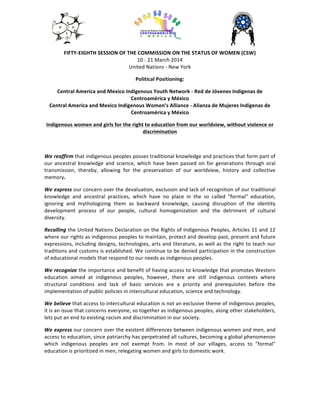
UN CSW 58 Indigenous Education Rights
- 1. FIFTY-‐EIGHTH SESSION OF THE COMMISSION ON THE STATUS OF WOMEN (CSW) 10 -‐ 21 March 2014 United Nations -‐ New York Political Positioning: Central America and Mexico Indigenous Youth Network -‐ Red de Jóvenes Indígenas de Centroamérica y México Central America and Mexico Indigenous Women’s Alliance -‐ Alianza de Mujeres Indígenas de Centroamérica y México Indigenous women and girls for the right to education from our worldview, without violence or discrimination We reaffirm that indigenous peoples posses traditional knowledge and practices that form part of our ancestral knowledge and science, which have been passed on for generations through oral transmission, thereby, allowing for the preservation of our worldview, history and collective memory. We express our concern over the devaluation, exclusion and lack of recognition of our traditional knowledge and ancestral practices, which have no place in the so called "formal" education, ignoring and mythologizing them as backward knowledge, causing disruption of the identity development process of our people, cultural homogenization and the detriment of cultural diversity. Recalling the United Nations Declaration on the Rights of Indigenous Peoples, Articles 11 and 12 where our rights as indigenous peoples to maintain, protect and develop past, present and future expressions, including designs, technologies, arts and literature, as well as the right to teach our traditions and customs is established. We continue to be denied participation in the construction of educational models that respond to our needs as indigenous peoples. We recognize the importance and benefit of having access to knowledge that promotes Western education aimed at indigenous peoples, however, there are still indigenous contexts where structural conditions and lack of basic services are a priority and prerequisites before the implementation of public policies in intercultural education, science and technology. We believe that access to intercultural education is not an exclusive theme of indigenous peoples, it is an issue that concerns everyone, so together as indigenous peoples, along other stakeholders, lets put an end to existing racism and discrimination in our society. We express our concern over the existent differences between indigenous women and men, and access to education, since patriarchy has perpetrated all cultures, becoming a global phenomenon which indigenous peoples are not exempt from. In most of our villages, access to "formal" education is prioritized in men, relegating women and girls to domestic work.
- 2. Therefore, we urge States to: 1.-‐ Ensure indigenous peoples self-‐determination by establishing legal, administrative or any other types mechanisms, allowing us to be subjects of our own identity development. In terms of education, ensure mechanisms for effective participation in the design, implementation and evaluation of our models of intercultural education. 2.-‐ Include the intercultural perspective at all levels of education for indigenous peoples, considering that interculturality is a process generated through dialogue on an equal footing between governments and peoples. The cultural relevance of educational models undergo holistic content issues that ensure effectiveness in the implementation of government and community measures for access to education. 3.-‐ Evaluate in conjunction with indigenous peoples, the relevance of geographical locations of schools at all levels, in order to prevent youths from our villages to travel long distances or migrate to urban centers or other locations. In particular, promote actions aimed at eradicating structural, social, economic and cultural inequalities and existing discrimination to access secondary education and upper level education between indigenous and non-‐indigenous applicants. 4.-‐ Ensure that bilingual intercultural education at all levels is conducted by teachers from indigenous regions, so that they are contextualized in our regulatory systems, have knowledge of our culture and hence facilitate the construction of learning processes. 5.-‐ Generate monitoring mechanisms composed of members from indigenous communities and State education authorities, to prevent and punish abuse, violence and discrimination within indigenous and non-‐indigenous schools. 6.-‐ Generate strategies in conjunction with indigenous peoples, addressing gender-‐differentiated approaches to eradicate sexist cultural causes that prevent girls, youth and female adults from having access to education on equal footing with men. 7.-‐ Promote indigenous peoples access to new technologies through previous contextualized diagnoses, developed and implemented in conjunction with indigenous populations, to determine actions and implementation mechanisms with intercultural and gender approaches. As indigenous youth we commit to foster the transfer of knowledge between generations that allow us to strengthen our identity as indigenous people, recognizing the historical processes of our peoples. We reaffirm our commitment to fight and defend our rights as indigenous peoples and we declare ourselves against the various forms of violence against indigenous peoples.
- 3. Signatory Organizations: Mujeres Indígenas del Wangki Tangni., Union Nacional de Mujeres Kunas "Nis bundor"., Coordinadora Nacional de Mujeres Mayas Garifunas y Xinca (Conmagaxi)., Zihuakali Casa de las Mujeres Indígenas en Nuevo León A.C., Mujeres Indígenas por CIARENA A.C., Centro Alternativo para el Desarrollo integral indígena, A.C., Colectivo Ma' alob Cuxtal., Grupo de Mujeres 8 de Marzo A.C., SUU NI MA RII A.C., Colectivo yani tundavií dikuintií., Colectivo Mujer y Utopía., Centro de Atención a la Familia Migrante Indígena de Tlaxcala A.C. (CAFAMI)., Casa de la Salud de la Mujer Indígena “Manos Unidas” A.C., Colectivo Revolución Mujer., “Kaansik Le Culturae Mayae”., Red Nacional de Mujeres Indígenas Tejiendo Derechos con la Madre Tierra RENAMITT., Corazones que Vuelan A.C., Mujeres en Acción con Palabra y Pensamiento Ayuujk MAPPA., Organización Nación P'urhépecha Zapatista., Coordinadora Nacional de Mujeres Indígenas CONAMI., Movimiento Agrario Indígena Zapatista MAIZ. Red de Jóvenes Indígenas de Centroamérica y México., Alianza de Mujeres Indígenas de Centroamérica y México., Foro Internacional de Mujeres Indígenas FIMI.
